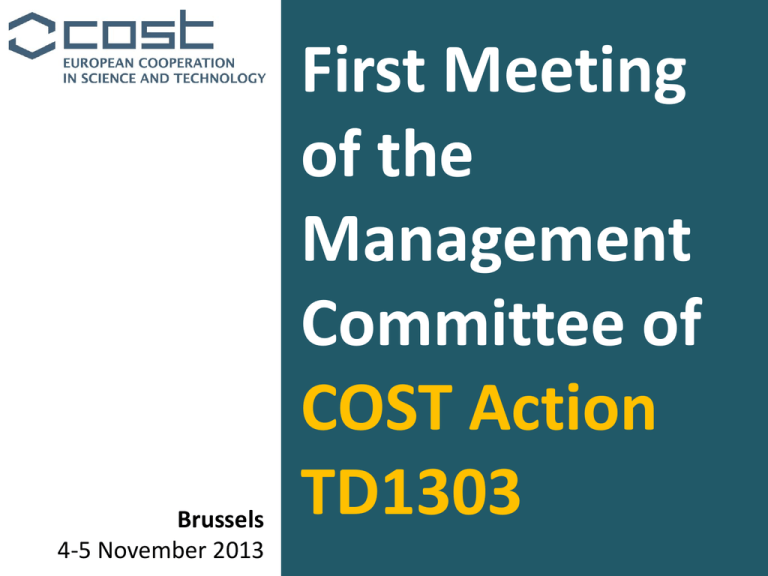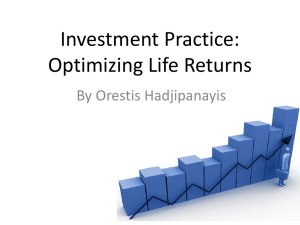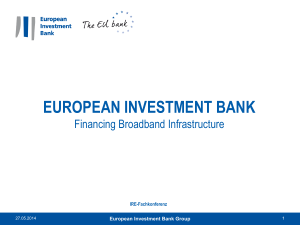
Brussels
4-5 November 2013
First Meeting
of the
Management
Committee of
COST Action
TD1303
“Asking researchers about the research funding
system is like asking birds about aerodynamics”
Jevons, 1973
General objectives | Working groups (WG)
“The main objective of the Action is to establish a powerful transboundary
network of partner institutions across Europe that are involved in education
and research related to arthropod-transmitted infectious diseases of man and
animals, a network addressing the growing importance of vector-borne
diseases at a time of Global Change, all integrated under the One Health
concept, and reflecting the complexity and demands of current high-end
research.”
• WG1: The “One Health” concept in the ecology of vector-borne diseases
• WG2: Barcoding, molecular diagnosis and next generation sequencing
• WG3: Geospatial tools in vector research
• WG4: Phylogenetics and phylogeography of vectors and vector-borne
pathogens
• WG5: Rare and emerging vector-borne pathogens
• Please, all MC Members Choose your WG!!!
Proposals for Working Groups Coordination
WG1
WG2
WG3
WG4
WG5
WG Leader
David Modrý
(Czech Republic)
Muriel Vayssier-Taussat
(France)
Laura Rinaldi
(Italy)
Agustin Estrada-Pena
(Spain)
Gad Baneth
(Israel)
WG Deputy Leader
Bulent Alten
(Turkey)
Laetitia Lempereur
(UK)
Vladimir Ivovic
(Slovenia)
Ozge Erisoz (Turkey)
Elena Coipan (Netherlands)
Silaghi Cornelia
(Germany)
•
WG1: The “One Health” concept in the ecology of vector-borne diseases
•
WG2: Barcoding, molecular diagnosis and next generation sequencing
•
WG3: Geospatial tools in vector research
•
WG4: Phylogenetics and phylogeography of vectors and vector-borne pathogens
•
WG5: Rare and emerging vector-borne pathogens
Proposals for other coordinating positions
STSM Coordinator
Publications coordinator
Conference coordinator
Web manager
Name
Dusan Petric
(Serbia)
Domenico Otranto
(Italy)
Antti Oksanen
(Finland)
Andrei D. Mihalca
(Romania)
Specific objectives (tasks)
1. To implement the “One Health” concept in the field of vectors and VBDs (research,
diagnosis, surveillance, health policies, education)
2. To implement a standardized medical terminology on vectors and VBPs and diseases
considering the “One Health” concept
3. To train young scientists during Training Schools and Short Term Scientific Missions in top
laboratories
4. To train Early Stage Researchers in general research issues (grant proposal writing,
manuscript writing, research management)
5. To indicate and implement standardized and modern research tools in the daily research
routine to facilitate metaanalysis
6. To facilitate ToK and disseminate scientific information
Eligible activities (budget plan) 2013-2014
• Meetings
• STSMs
• Training schools
• Publications
• Other
• Overhead
TOTAL
72,210 €
25,000 €
40,000 €
6,300 €
2,490 €
21,000 €
167,000 €
Meetings
Meeting types
• MC Meetings
• for our Action (suggestion): 1 MC meeting per year
• duration: half day
• Core Group (CG) Meetings
• CG must have decision power
• meeting as often as necessary, in principle as internet meeting/voting
• CG consists of 12 people:
• Action Chair + Vice-Chair
• Publications coordinator + STSM Coordinator + Conference coordinator
• WG Leaders
• other additional members according to specific needs
• WG Meetings
• for our Action (suggestion): 1 WG meeting per year
• duration: one day
• Action Conferences/Workshops
• for our Action (suggestion): 1 Annual Conference
• duration: one and a half day
• MC members should make proposals for workshops, seminars etc.
• Dissemination meetings (attendance to other conferences)
• in principle to European Conferences
• maximum 2 participants/year (must be in the W&B or pre-approved)
Meetings
Who?
Day 1 a.m.
Day 1 p.m.
Day 2 a.m.
Day 2 p.m.
Day 3 a.m.
Day 3 p.m.
Arrival + Dinner
arrival
MC
WG
discussion
Presentations
Presentations
Departure
MC Member
WG Members
Eligible participants
Communication of research results
Scientific debates and action plan to implement the
objectives
Organization and management of the Action
Annual Conferences
• One per year (4 during the Action)
• Organized by the MC (under the coordination of the
Conference Coordinator) + Local organizing committee
• Locations?
2014 - Cluj-Napoca (RO) ?
2015 -?
2016
2016 - Turku (FI) ?
2017 - ?
2014
Annual Conferences
•
2014 (Cluj-Napoca, Romania ?)
•
Title:
•
1st Conference on Neglected Vectors and Vector-Borne Diseases
(EurNegVec): with MC and WG Meeting of the COST Action TD1303
•
Date proposals
•
principle: which days of the week? WED-FRI?
•
Decided: 8-11 April 2014
•
Deadline for abstract 15 January 2014
•
Number of participants to be reimbursed (n=87):
•
MC Members (n=40)
•
WG Members (priority to ESR) (n=47): based on abstract submission?
•
Budget (72210 EUR)
•
Travel costs: 69600 EUR
•
Organisational support: 2610 EUR (from the Action’s Budget)
•
LOS: Can ask additional support from COST
•
participation fee from participants not-eligible for reimbursement
•
sponsors, local public funds, institutional funds etc.
Short Term Scientific Missions (STSMs)
COST Principles for STSMs:
• should specifically contribute to the scientific objectives of the COST Action
• geographical and gender balance
• applications from ESR should be privileged
Rules
• STSM applicants must be engaged in a research programme as a postgraduate
student or postdoctoral fellow, or be employed by or officially affiliated to an
institution or legal entity (public of private)
• Duration 5-90 days (single grant period) (may be extended 91-180 days for ESR)
NNC: Armenia, Algeria, Egypt, Russian Federation, Ukraine, Tunisia, Republic of Moldova, Albania, Morocco, Lebanon, Belarus, Georgia,
Montenegro, Azerbaijan, Palestinian Authority, the, Syrian Arab Republic, Jordan, Libya
IPC: Argentina, Australia, New Zealand, South Africa
STSMs
Financial support:
• based on the budget requested by the applicant and the evaluation by the Action
responsible
• Maximum 100 EUR/day
• Maximum 500 EUR for travel expenses
• Maximum 2000 EUR/grantee (3000/grantee for a duration more than 91 days)
Our internal rules
• Proposed: 25 STSMs/year | average 1000 EUR/STSM (Total budget 25000 EUR)
• STSM Coordinator + WG Leaders + MC Chair (STSM Committee) (conflict of
interest!). The setup of the committee, its composition and the mandate to take
decisions must be approved by the MC
• Application submitted continuously, but assessed 2 times per year
• Deadline 28 February | Evaluation 1-31 March | Results 1 April
• Deadline 15 June
• If additional budget is available, the MC/CG can decide for one more
application session(s)
• Is it necessary to limit the duration of a STSM? If yes, how much?
STSM rules draft
Documents required for application
1. Written agreement of the host institution
2. Correctly filled on-line application form
3. CV
4. Full work plan (study/research/training)
5. Motivational letter (guidelines!)
6. Recommendation letters
7. Self-signed statement regarding any previous COST-related financing from the past
• Grading
• points 4-5 graded from to 5 pts (excellent) to 1 pt (rejected)
• ESR 0.3 pts
• not in the same year (rejected)
• not in the same lab (per action) (rejected)
• Ranking
• if more applicants get the same points, they will be ranked according to age, gender
(favor the minority gender), nationality (avoid repetitions)
• waiting list (if selected applicants refuse from various resons)
• the budget for each STSM will be decided by the STSM Committee, according to the
destination and according to COST rules
Training schools (TS)
COST Principles and rules for TS:
• at least 3 trainees to 1 trainer
• duration 3-15 days
• location: any participating COST country/NNC Institution
• MC/CG must decide on the eligible participants (trainees and trainers)
• Selection criteria and eligibility for trainees
• affiliation to COST, NNC or EU-RTD
• country and sex balance
• priority to ESR
• Selection criteria and eligibility for trainees :
• affiliation to COST, NNC, IPC, EU-RTD
• maximum 4 invited speakers
• no repetition of invited speakers is recommended
• Recommended budget
• Trainers: similar to meetings
• Trainees:
• maximum 160 EUR/day
• maximum 300 EUR for travel expenses
• maximum 1500 EUR/trainee
Training schools (TS)
•
•
•
•
•
•
Each WG has to organize at least one TS during the Action
Proposal (total 9 TS during the Action):
•
WG1: 1 TSs
•
WG2: 3 TSs
•
WG3: 2 TSs
•
WG4: 2 TSs
•
WG5: 1 TSs
Organized by the MC (under the coordination of the respective WG Leader) + Local
organizing committee
Proposed for 2014 (total budget 40000 EUR)
•
2 TS (WG?, Location? Topic? Period?)
•
Volunteers for 2014
•
For each TS: Total 20000 EUR:
•
20 participants (ESR) x 700 EUR = 14000 EUR
•
4 trainers x 800 EUR = 3200 EUR (no lecture fees eligible!)
•
Organizational support 2800 EUR
•
LOS: Can ask additional support from COST
•
participation fee from participants not-eligible for reimbursement
•
sponsors, local public funds, institutional funds etc.
Selection criteria for trainees? Same as STSM?
Selection of Trainers should be the responsibility of the WG.
Publications
Types:
• produced during an Action’s lifetime (funded by the Action’s Budget):
• books (hard copy or electronic), reports, journal articles, brochures, flyers and
other types of publication, including in electronic format e.g. DVDs and CDROMs
• website
• participation to other meetings
• produced at the end of the Action (funded by COST Office)
• Final Action Publication
• COST strongly recommends e-publications or the use of environmentally friendly
materials or print-on-demand
Budget 2014:
• 6300 EUR
• Eligible costs:
• The purchase and distribution of a fixed number of copies
• Proofreading, editing, production and distribution costs
• Multimedia material production costs
• The production of proceedings
• Production of other materials (e.g. flyers, posters, postcards)
• Website development
Publications
EurNegVec Publications:
• Articles published in peer-reviewed journals
• When an EurNegVec member co-authors a scientific paper in the field of the
Action, in the Acknowledgement section: “The work of initials was done
under the frame of EurNegVec COST Action TD1303”
• Thematic journal issues in peer-reviewed journals
• To be decided within the MC
• Discussion with Editors-in-chief
• To decide (all proposals to be sent to the Publication Coordinator):
• Journals? Topics? Number of articles? (how many invited reviews, original
research etc.)
• Eligibility of publication fees? Should we pay from the Action’s Budget?
• Methodological guidelines
• standardized diagnosis and surveillance of vectors and vectors-borne diseases
• proposals from each WG? First WG Meeting should come with clear proposal.
• horizontal approaches? (inter-WG)
• Manuals for the TSs?
• Monographs
• proposals?
• editors/coordinators?
• Proceedings
• Annual Conference abstracts
Proposal from Agustín Estrada-Peña
Guideline(s) for the collection of “bugs” in Europe:
• where in the habitat collect the bugs, with instructions about how and where carry out
active surveys
• how to identify the species, including illustrations for immatures and adults*
• in which parts of Europe is necessary to carry out periodic active surveys to detect or to
monitor populations of spreading or native arthropods
• what are the variables that have influence on development and survival of arthropods, to
avoid people to frequently reinvent the wheel, and to check the variables that really
matter.
• distribution maps?
*The point 2 is of special importance, because nobody has adequate keys, everybody use
the first thing found on Internet and there is not an adequate knowledge of the taxonomy
necessary for determination of arthropods. Bar coding is not yet working well as to identify
vectors. We need to provide with drawings and probably there is the need to centralize the
preparation of keys (and drawings) and to invest some money in the salary for a professional
team making drawings. SEM are not useful. Such guide should be ideally published in an
open access format allowing everyone for easy and free download.
Ticks, Sandflies? Any other?
Proposal from Agustín Estrada-Peña
Guidelines with procedures to detect DNA of pathogens in arthropods:
• Detailed protocols
• Detailed primers
• Detailed instructions about “if you found something different, please do not report it,
better first check it twice”. This is expected to contribute to stop (or to decrease) the
publication of “garbage”.
• It should with coordinating editor and multi-author approach
Website
• Detailed rules are available in the COST regulations
• Website management:
• General: Action Chair
• Specific contents
• STSM Coordinator
• Conference Coordinator
• Publication Coordinator
• WG Leaders
• Budget:
• 2014: 3000 EUR
• 2015: 1000 EUR
• 2016: 1000 EUR
• 2017: 1000 EUR
Website
EURNEGVEC: EUROPEAN NETWORK FOR NEGLECTED VECTORS AND VECTOR-BORNE INFECTIONS
About the Action
The network
Events and news
Publications
•
Abstract and keywords
•
By country
•
MC Meetings
•
Monographs
•
Background
•
By topic
•
WG Meetings
•
Guidelines
•
Objectives & benefits
•
By WorkGroup
•
Annual Conferences
•
Fliers and brochures
•
Scientific programme
•
Alphabetical
•
Training Schools
•
Scientific papers
•
Organisation & Timetable
•
STSMs
•
Maps
•
Dissemination plan
•
Available positions
•
Press realeses
[News] [Links] [Downloads] [Private area] [Contact]
Logo (Designer Oana Onit)
Logo (Designer Anna Benczedi)
Logo (Designer Ana Amaro)
1
2
3
Still missing countries
•
•
•
•
•
•
•
•
•
•
Austria
Bulgaria
Cyprus
Denmark
Iceland
Latvia
Lithuania
Luxembourg
Malta
Sweden




